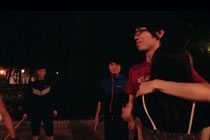
The Devil Teacher
Miss Wong was described as a “devil teacher” by her students. How much of a “devil” is she? Does her “devilish” behaviour indeed break the law?

The Wrong Way to Fight Against Bullying
Ho Yin, a small and weak boy, was often bullied by his classmate, Chi Chung and his peers. Ho Yin became sick of being bullied and tried to defend himself, but the method he used was wrong.

Unjust retaliation
Sin Yan, a Form 3 student, is one of the top students in her class, but she is often bullied by Chi Chung and his peers at school. One day, Chi Chung threatened Sin Yan to force her to help him cheat on a test, but Sin Yan did not do it. What revenge will she face?

The Triads
Tsz Kit and his girlfriend were chatting in a park late at night. Some gang members were in the park, too. What might happen?

Midnight Battlefield
Brian and Chi went to Lan Kwai Fong one night to have a good time with their girlfriends. Dragon and his friend Hung Chi had been drinking and were hanging around on the street. Dragon decided to hit on (try to flirt with) Brian’s girlfriend. A dispute broke out and led to a street fight between the two young men…